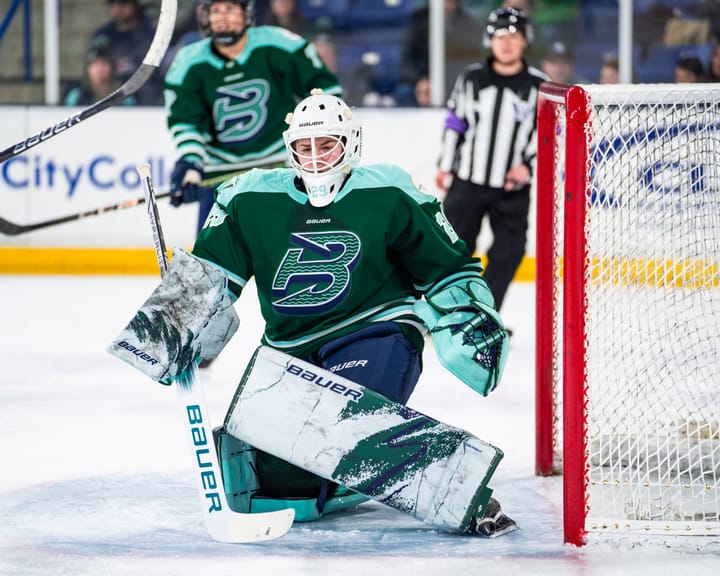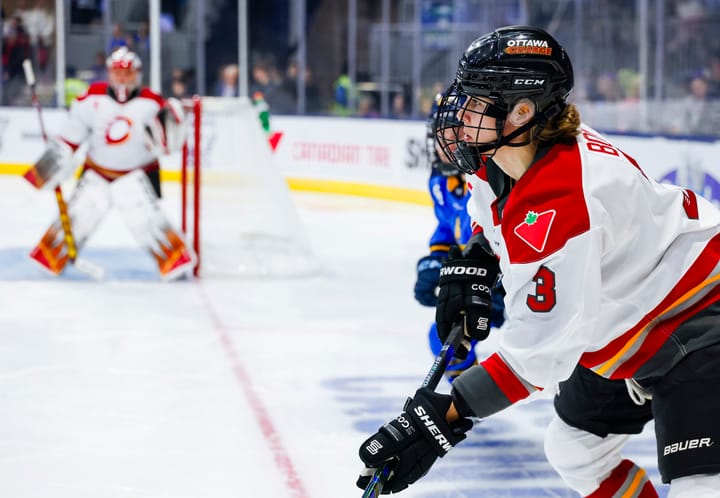Canada and USA begin final push towards the Olympics
With the last Canada-USA game in the books, the focus turns to naming the rosters and making final preparations towards PyeongChang.
Canada and the U.S. closed out their pre-Olympic series in Edmonton on Sunday, with the hosts taking a 2-1 overtime win to claim the series 5-1, or 5-3 including the 4 Nations Cup.
Four of Canada's wins came in the month of December.
Marie-Philip Poulin opened the scoring for Canada on the power play at 17:15 of the first period, just four seconds after the first penalty of a 5-on-3 expired. Rebecca Johnston and Laura Fortino were credited with the assists.
Hilary Knight tied things up at 14:02 of the second, assisted by Kendall Coyne and Monique Lamoureux-Morando.
A scoreless final frame forced overtime, where Jennifer Wakefield buried the puck with 27 seconds remaining after Natalie Spooner carried it deep into the U.S. zone. The team and crowd celebrated before the play was reviewed, then celebrated again when the goal was declared good.
“It felt great,” said Wakefield. “Spooner did a really nice play — she got a nice pass from ‘Tino’, she muscled her way in and was able to get a good shot on net — and I was just there at the right time to put it in. It’s awesome to finish off with a win and carry that momentum. I thought we played an alright game. We have way more areas we need to improve on, and so it was nice to get the win even though we didn’t play necessarily our best.”
The Canadians led 11-8 on the shot clock after the first period but trailed 12-4 in the second and 13-6 in the third.
Shannon Szabados turned away 34 of 35 shots faced in front of her hometown crowd, while Maddie Rooney made 24 saves on 26 shots for Team USA.
“She’s such a professional,” said Canadian head coach Laura Schuler of her netminder. “I thought she did a really good job with her rebound control and really settled things down when we needed to get settled down. Was able to cover pucks up and get some whistles for us so that we could get some changes. She’s such a smart goalie, so it was great to have her.”
“I thought we played great tonight,” offered U.S. captain Meghan Duggan. “Didn’t get the result we wanted, and it just makes us hungrier. I’m confident in our team, confident in what we can do when we’re playing our best hockey, when we’re putting together a full 60 minutes. And that’s the sport: you win games, you lose games. But for us, we’ll clean up a few things, but [we’re] happy with the way we played and like I said, we’re just hungry now.”
A near-record crowd
The official attendance of 17,468 marked the second-largest crowd in women's hockey history, a feat that came as no surprise to the locals on Team Canada. Though Edmonton's developed a reputation for successfully hosting major events — from the inaugural FIFA U-19 Women's World Cup in 2002, to the 2012 IIHF World Junior Championship, to the 2015 FIFA Women's World Cup — the Dec. 17 contest marked the first-ever international women's hockey game played in the city.
“Just from personal experience, I know that Edmonton fans are amazing, so we’re really excited to play in front of a great crowd and just do our best to bring our best performance for everyone,” said St. Albert product Meaghan Mikkelson before the game.
Although the region is by no means a non-traditional hockey market, the value of bringing the highest level of the women's game to the city can't be overstated.
“I think of when I was a young girl growing up, and having the opportunity to watch Canada play on TV, that was amazing in itself,” Mikkelson reflected. “For these girls in the city, in Alberta, to be able to come and to watch this game, it’s amazing. It’s great exposure for the women’s game and I think that as players growing up in minor hockey in different communities, we understand and realise the importance of growing the game, and so there’s a huge component when it comes to that obviously, and we’re just excited to be in Edmonton here.”
Even the Americans appreciated the hostile atmosphere.
“They’re here to watch hockey, so whether you’re on the other team or not, they’re still here to watch you and it’s a fantastic crowd,” said Knight. “Thank you, Canada, for all the support— that was awesome. Even though you’re booing us, it doesn’t matter. It’s great energy. You want to play in front of a lot of people and you want to see those young girls having that dream being able to see us in the flesh, so it’s huge.”
Over and done with
The Canadians are enjoying their success, but as important as the games themselves may be, both teams are well aware that these results mean nothing when it comes to the Olympics.
“I’m really happy with our process and where we’re at,” affirmed Schuler. “One thing for sure [is] that our girls have been so open to little tweaks and changes in our game plan to help us continue to get better and that, I think, has been a difference in helping us be successful. But there’s still more work to do, for sure.”
“Now the real thing is going to happen in February,” said Poulin. “It’s behind us now and we’ve got to keep moving forward and improving because I know they’re going to come out hard, and for us we’ve got to focus on ourselves and keep going.”
“It’s all about the practice heading in there,” explained Wakefield. “You start a clean slate when you go to the Olympics, but we have that confidence and that confidence that we need to get better.”
“[It’s important] knowing that we can beat them,” echoed Poulin. “At the beginning of the year, the last World Championships — we know we have trouble against them, so obviously having those wins under our belt feels pretty good. But like I said, the work is not done and [we’ve] got to keep going.”
As for the Americans, not only do they insist that they remain confident, but they're also taking advantage of the series loss to claim underdog status going into the Games.
“The Olympics are the Olympics, it’s a totally different tournament in itself,” said Knight. “But we’re the underdog going into the Olympics and it’s been 20 years since we won a gold medal, so it’s a really exciting time to be potentially a part of this team. We’re excited to get on the world stage again and represent our country.”
Whether a team that's won seven of the past eight World Championships — including all three since Sochi 2014 — can genuinely be considered underdogs is debatable, but the veracity of the claim won't stop the U.S. team from using it as motivation.
Choosing the rosters
With the six-game exhibition series and 4 Nations Cup behind them, Canada and the U.S. are taking different paths towards finalizing their Olympic rosters.
The Canadians are staying in the Edmonton area for back-to-back Alberta Midget Hockey League games as part of the Esso Series, on Dec. 19 and 20. Team Canada is known for its gruelling centralization schedule, which features dozens of games in addition to intense practices, often with little downtime.
“We want to make sure that we stress ourselves so that when it comes to the Olympics, we’re prepared for the pressure that we’re going to be facing,” Schuler explained. “That’s what centralization is about, so that when we get to the Olympics, we’ll be at our best.”
While the Canadians are jumping back into their competitive schedule with the aim of preparing themselves for the tight turnarounds they'll experience in PyeongChang, the U.S. team will practice in Tampa before breaking on Dec. 21. They have no further games scheduled before the roster is named on Jan. 1, meaning that the team staff already have all their material when it comes to determining their Olympic squad.
“We will do what we have done all along,” said U.S. coach Robb Stauber of the upcoming two weeks. “We’ll evaluate tonight’s performance — not necessarily the score, but the things that we’re looking for in certain players. Upon reviewing everything and looking at the details of what’s going to help us be the best team, those details will reveal themselves as they have a tendency of doing. The things that we value most, they’ll be revealed and then we’ll make our decisions.”
When it comes to selecting the Olympic team, Schuler, for her part, is grateful for Canada's heavier schedule.
“[Evaluation] is something that we continue to do no matter who we’re playing against,” she explained. “We’re looking at our team as a whole and also obviously looking at players individually and what they can do, what they bring, and where they fit into our team.
“It’s been a process from the get-go and every single game that we have played has been a huge impact on our decisions and what way we go. Obviously tough decisions for sure to make, and thank goodness we have some more games here.”
Beyond having fewer games to use as measuring sticks, the U.S. team's evaluations are complicated by the late additions of Cayla Barnes, Sidney Morin, and Haley Skarupa to the player pool. Skarupa and Morin, in particular, were added in late November and will have only spent three weeks with the squad before the roster's named, compared to more than three months for most of their teammates.
“I don’t think [being a late addition adds pressure],” said Morin. “I just came in, tried to play loose, have fun, and represent my country well. It’s a great honour again to wear this jersey and it’s been fun, so we’ll see what happens.
“Everyone’s heading home on the 21st and the team will be announced on January 1st so I think everyone will be biting their nails a little bit before that announcement, but it’s fun, as well.”
If the players aren't feeling the pressure, Stauber knows the coaching staff certainly has its work cut out for it.
“You think about the players we brought in, they’ve played very well in just a short period of time,” he offered. “We have some players that have only played three or four games now and they’ve done a really good job. At the time we named the team, the national team, they were right on the bubble. So bringing them back in, we were right by having them on the bubble, because they’ve come in and done just a really, really good job. That’s why we brought them in: we wanted to see if we were missing something.
“And at the time that we brought them in, at the end of the day, we’re running out of time. If there are things that you think you want to tweak as a staff, then you’ve got to get them in and give them an evaluation, and we like the players that we brought in. So it’ll be interesting as we kind of dial everything in and like I said, focus on the details that we think are very important.”





Comments ()